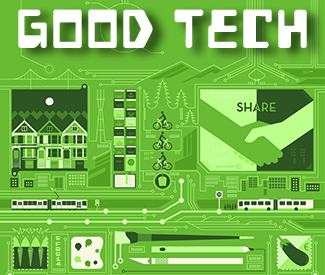marke@sfbg.com
GOOD TECH Like Tabasco sauce, Lady Gaga, and the color teal, technology in itself is neither good nor bad — it’s all in how you use it. (Indeed, you could argue that those first three examples are technological feats in their own right: Just don’t use too much, please!) And while battles rightly rage about how the Bay Area’s tech industry is reweaving our social fabric, creating and applying technology is an art in itself, albeit one that can have huge economic and political impact.
It can be difficult to see past the whizbang gizmos, marketing dazzle, and glowing dollar signs of how technology is normally presented to us. But in this issue we wanted to take a deeper look at some of the ways technology is impacting or enhancing Bay Area life, and highlight some of its possibilities in addressing some of the city’s real problems (no, not parking or hailing a cab). For all the talk about sharing economies and communal interaction, there’s still a huge gulf between what’s considered “innovation” and what actually offers a path toward civic solutions.
Important questions still hang in the air (beyond the environmental and labor impacts of manufacturing such technologies): How can innovation be better applied to help city infrastructure and social services? How can we integrate startup energy into city policy-making and government transparency? Can the effects of “disruption” be assessed using other indicators beyond market value? In what ways can we ameliorate the knee-jerk resistance to innovation from all sides when it comes to addressing the explosion of homelessness, hunger, and child poverty in the Bay Area? Can we develop new “inputs” or ways of including all Bay Area voices in the conversation about how technology is transforming the way we live?
And why can’t we Kickstart Muni, anyway?
Lately, there’s been some movement toward addressing some of these concerns, especially when it comes to art and culture. The huge, forthcoming 5M project on Mission plans to not only house Yahoo, but also Intersection for the Arts and SF Made, explicitly integrating local arts and businesses into the start-up incubator template. A recent forum hosted by music app WillCall on how tech can better support the local music and nightlife industry packed the Public Works nightclub. Proposals to help teach more coding in schools and make government more transparent are gaining steam.
Of course, it’s always wise to maintain a healthy skepticism about the latest shiny thing, and to realize the limits of technology — often it can’t even clean up its own mess — and especially the people behind it. But it’s also important to keep pushing the conversation about technology’s role in civic engagement forward in positive, thought-provoking, even spicy new directions.

